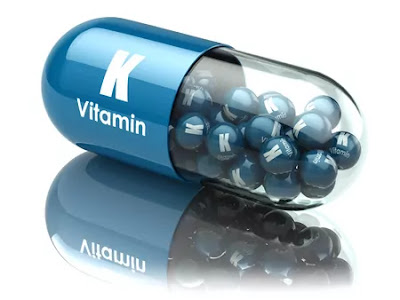Vitamin-K (phylloquinone)
Vitamin-K is a group of compounds collectively known as Phylloquinone.
Types of vitamin-K
The most important of these compounds appears to be vitamin K1 and vitamin K2.
Vitamin K1 is obtained from leafy greens and some other vegetables.
Vitamin K2 is a group of compounds largely obtained from meats, cheeses, and eggs, and synthesized by bacteria.
Functions of Vitamin-K
Vitamin K functions in the body in various ways.
Like,
1.Functions for Bone health
vitamin K supports the maintenance of strong bones, improves bone density and decreases the risk of fractures. However, research has not confirmed this.
2.Functions for Cognitive health
Increased blood levels of vitamin K have been linked with improved episodic memory in older adults.
3.Functions for Heart health
Vitamin K may help keep blood pressure lower by preventing mineralization, where minerals build up in the arteries.
This enables the heart to pump blood freely through the body.
Mineralization naturally occurs with age, and it is a major risk factor for heart disease.
Adequate intake of vitamin K has also been shown to lower the risk of stroke.
4.Functions for blood clotting
Vitamin K helps to make four of the 13 proteins needed for blood clotting, which stops wounds from continuously bleeding so they can heal.
People who are prescribed anticoagulants to prevent blood clots from forming in the heart, lung, or legs are often informed about vitamin K.
Because of its blood clotting action, vitamin K has the potential to counteract the effects of blood thinning medications.
Sources of vitamin-K
Sources of Phylloquinone (K1) :-
- Green leafy vegetables including collard and turnip greens, kale, spinach, broccoli, Brussels sprouts, cabbage, lettuces
- Soybean and canola oil
- Salad dressings made with soybean or canola oil
- Fortified meal replacement shakes
Sources of Menaquinones (K2) :-
- Natto (fermented soybeans)
- Smaller amounts in meat, cheese, eggs
Daily Requirements :
AI for RDA (Adequate Intake for Recommended dietary allowance)
For adults 19 years and older :-
- 138 micrograms (mcg) daily for men
- 122 mcg for women
- 90 mcg for those who are pregnant or lactating.

 Posted by
Posted by 

comment 0 Comments
more_vert